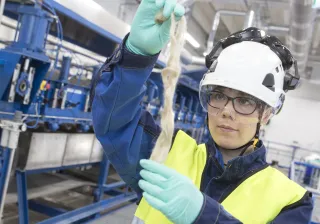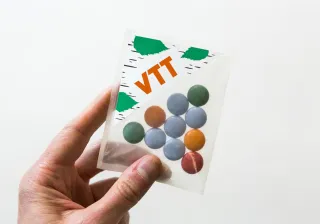European ForestValue research initiative brought together world class excellence in enzymology, cellulosic fibre processing and analytics are to develop innovative and green enzyme technologies for convertion of wood to high-performance materials.
Forests are high value natural and renewable resources that provide economic and environmental welfare to the society. Cellulose is the major product from the forests, currently mainly used in paper, paperboard and packaging. The potential of wood cellulose in material applications is however enormous, ranging from textiles to printable electronics. Growing demand on renewable materials and sustainable manufacturing technologies is also evident.
The objective of the European ERA-NET Cofund Action “ForestValue – Innovating the forest-based bioeconomy” is to promote increased innovation and competitiveness in Europe’s forest-based sector and support its transformation from a resource-intensive to a knowledge-intensive, productive, resource-efficient and resilient sector. In the project “FunEnzFibers – From fundamentals to valorization: Enzymatic oxidation of cellulosic fibres and underlying mechanisms”, researchers from VTT, University of Natural Resources and Life Sciences (Austria) and Norwegian University of Life Sciences use recent insights into enzyme technology to develop new sustainable methods for producing cellulose-based materials.
Enzymes are nature’s own tools for facilitation of chemical reactions, exploited in the industry to reduce consumption of energy and harsh chemicals. Enzymatic processing of forest materials has been extensively studied in the past decades, with focus on conversion of cellulose to sugars and further to chemicals and biofuels, such as ethanol. This has led to novel insights into how cellulose can be degraded by enzymes. Among other things, this has led to the discovery enzymes that have a novel capability to oxidize cellulose, which is not only beneficial in cellulose degradation, but also represents a great potential for modification of cellulose for material applications. The FunEnzFibres project will build on these oxidative activities and further develop enzyme-based refining of cellulosic fibres, in collaboration with an industrial stakeholder group.
The project brought together top experts in cellulose oxidizing enzymes (NMBU), biomass processing (VTT) and cellulose analytics (BOKU), for development sustainable enzyme-based processes in production of textile fibres and nanomaterials.
The research partners are all leaders in their complementary fields. “The FunEnzFibres project gives us a fantastic opportunity to work together on developing fundamental knowledge and applications generating more value from our forests”, says Kristiina Kruus, the consortium coordinator.
Further information:
BOKU
Professor Antje Potthast, [email protected]
NMBU
Professor Vincent Eijsink, [email protected]
VTT Technical Research Centre of Finland
Senior Scientist Kaisa Marjamaa ([email protected])
Dean (Aalto University, School of chemical engineering) Kristiina Kruus ([email protected])











